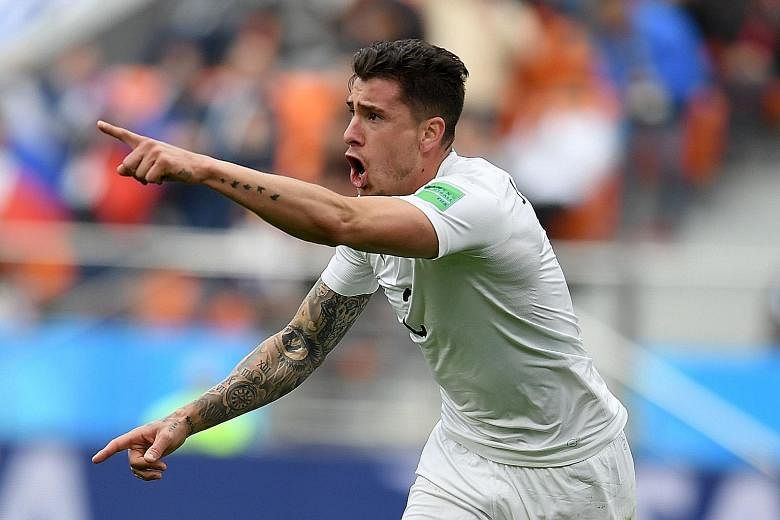EKATERINBURG • Slowly, slowly, it was coming. After 80 minutes in which almost nothing happened, including the non-appearance of Mohamed Salah, Uruguay in the final minutes had just begun to increase the pressure.
There was a volley from Edinson Cavani pawed away by Mohamed El Shenawy, then a free kick smacked against the post by the same player. And then, finally, with a minute to go, Jose Gimenez rose to meet a right-wing free kick with a powerful header and Uruguay, for the first time since 1970, won their opening game at a World Cup.
"In the history of football we have broken a spell," said Uruguay coach Oscar Tabarez. "We either die or we kill, we have to keep progressing."
Much of the game had seemed to conform to the stereotype of modern international football.
The better teams can defend and can hold their shape, and very few sides have the cohesion to attack with the pace or precision to break them down. That was exacerbated here by a pitch that seemed to have been insufficiently watered.
As in the early stages of the opening game, before Saudi Arabia's implosion, there was a sense that the ball was sticking, further reducing the pace of attacks.
The result is slightly scrappy, underwhelming football, short of fluidity or goal-mouth action - and, correspondingly, a premium on the sort of dynamic attacking player who can transform games.
The brightest of those was missing. After all the excitement of Thursday, and assurances from Hector Cuper in a press conference, Salah did not start.
He had seemed tentative performing some basic windmill exercises in training and his only involvement here was to elicit a roar from the Egyptian fans as he trotted out to warm up and then another cheer - and a chorus of Happy Birthday (he turned 26 yesterday) - when he was shown on big screens midway through the first half.
Not that Uruguay are without great attacking individuals, but there is a feeling that Cavani and Luis Suarez, both 31, owed Uruguay big World Cup performances.
Cavani, operating in wide roles, had little impact in 2010 and 2014 and compounded the image of himself as a player uncomfortable in major tournaments with his red card against Chile in the quarter-final of the 2015 Copa America.
Suarez had, at least, contributed five goals in 2010 and 2014, but his two most memorable acts at World Cups remain a handball and a bite.
It was difficult here to avoid the conclusion that neither really benefited from the service they received. Uruguay dealt in a series of slightly aimless long balls that seemed to play into the hands of Egypt's well-organised and muscular defence.
But the chances began to mount and, in the end, Egypt cracked.
The North Africans are hoping Salah can start the game with Russia on Tuesday, now a must-win.
Aside from the Liverpool ace failing to get off the bench with his shoulder injury, another major talking point was also off the pitch - thousands of empty seats in one main stand at the Ekaterinburg Arena were an embarrassing sight for Fifa and local organisers.
"He's certainly important, nobody can deny that, but you need a good team too - and we are a good team," said Egypt coach Cuper.
"If Mo had been on the pitch, it may have been different but we can't know that. He did not play today because we wanted to avoid risk or danger, but I think that he will be fine for the next match.
"We want him in top form for Saudi Arabia and Russia."
THE GUARDIAN, AGENCE FRANCE-PRESSE

